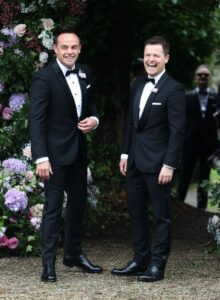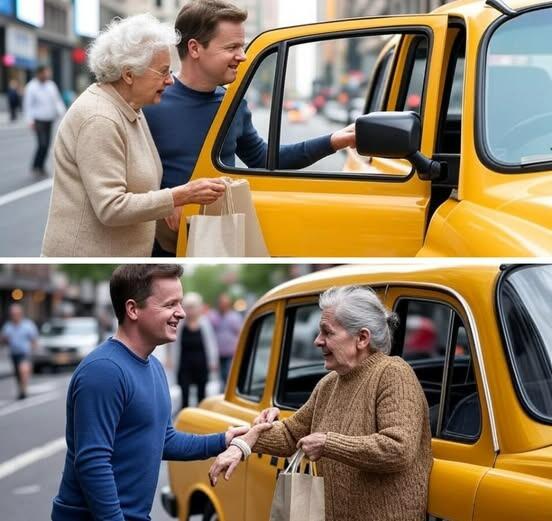After a 76-year-old woman knocked on his car window at a petrol station thinking he was her taxi, Dec simply smiled and drove her home. Three days later, Ant & Dec showed up at her flat with £30,000 worth of medical equipment and a team of live-in nurses. But it’s the handwritten card Dec left behind that made her cry…👇🚖👵
The Ride That Changed a Life
In the bustling streets of Newcastle, where the hum of city life mixed with the warmth of its people, Ant McPartlin and Declan Donnelly—Ant & Dec—were beloved figures. At 49, their infectious energy had made them TV royalty, but their hearts remained rooted in their Geordie upbringing. One rainy evening in April 2025, Dec was filling up his car at a petrol station when a 76-year-old woman, Eileen Murray, tapped on his window. Her glasses fogged with rain, she mistook his car for her taxi. Instead of correcting her, Dec flashed his trademark smile and said, “Hop in, love. Where’re we headed?” Eileen, a bit flustered but grateful, gave him her address, and Dec drove her home, chatting about the weather and Newcastle United as if they were old friends.
Eileen’s flat in a quiet council estate was modest, cluttered with photos of her late husband and her two grown children, now living far away. As Dec helped her out of the car, she mentioned her struggle with COPD, a lung condition that left her housebound, reliant on an outdated oxygen machine. Her pension barely covered essentials, and home care was a distant dream. Dec listened, his easy grin hiding the weight of her words. He wished her well and drove off, but Eileen’s story stayed with him.

Back at their shared office, Dec told Ant about the encounter. They’d grown up around people like Eileen—resilient, proud, but often forgotten. Her situation reminded them of their own grandparents, who’d faced hardship with quiet dignity. Without telling anyone else, they hatched a plan. Three days later, they returned to Eileen’s flat, not with cameras or fanfare, but with a van loaded with £30,000 worth of medical equipment: a state-of-the-art oxygen concentrator, a hospital-grade bed, and mobility aids. They’d also arranged for a team of live-in nurses to care for Eileen, covering costs for a year through their foundation, “Ant & Dec’s Community Fund.”
Eileen opened her door to find Ant and Dec, alongside two nurses and a delivery team. Her hands trembled as they explained the gift. “We couldn’t stop thinking about you,” Ant said, his voice soft. “This is to make things a bit easier.” The nurses set up the equipment while Ant and Dec helped rearrange her tiny living room, joking to keep the mood light. As they prepared to leave, Dec slipped a handwritten card onto her table. Eileen didn’t notice it until after they’d gone. When she opened it, tears streamed down her face. The card read: “Eileen, you’re not alone anymore. Keep cheering for the Magpies. Love, Dec & Ant.”
The note wasn’t just words—it was a promise. Dec had written about how Eileen’s warmth reminded him of his mum, and how they wanted her to feel cared for, like family. He’d included a phone number for the nurses and a voucher for a local café, encouraging her to get out when she felt stronger. The card’s sincerity, paired with the life-changing gift, overwhelmed Eileen. She called her daughter, sobbing as she read the note aloud. Her daughter shared the story on X, posting a photo of the card and the new equipment. “Ant & Dec didn’t just help my mum,” she wrote. “They gave her hope.” The post went viral, with #EileensCard trending as fans shared heart emojis and stories of similar kindness.
Reporters were stunned, not just by the £30,000 gift, but by the quiet way it was done—no press, no TV special. At a Britain’s Got Talent press event, a journalist asked about Eileen. Dec chuckled, glancing at Ant. “She thought I was her taxi driver,” he said. “We just wanted to make sure she’s looked after.” Ant added, “She’s a proper Geordie lass. Deserves the best.” They deflected praise, but the story spread, with X users writing, “This is what fame should be” and “That card made me cry too.”

Eileen’s life transformed. The nurses helped her manage her COPD, and the new equipment let her move around her flat with ease. She started joining neighbors for tea, her spirits lifted by the knowledge she wasn’t forgotten. Her children visited more often, inspired by Ant and Dec’s gesture. The community rallied, too—local shops sent meals, and a youth group offered to tend her small garden. Ant and Dec’s foundation quietly expanded, funding similar medical support for other seniors in Newcastle, raising £100,000 in donations inspired by Eileen’s story.
Eileen framed Dec’s card, hanging it beside her husband’s photo. She wrote the duo a thank-you letter, her handwriting shaky but clear: “You didn’t just give me machines. You gave me my life back.” They kept it in their office, next to a Newcastle United scarf she’d sent. They visited her when they could, sharing a cuppa and football banter, always keeping it low-key.
By May 2025, Eileen’s story had sparked a movement. Nursing homes across the North East launched “Geordie Guardian” programs, pairing seniors with volunteers for companionship and support. Ant and Dec backed it quietly, their foundation matching donations. At a Newcastle match, they wore scarves with a small “E” stitched in black and white, a nod to Eileen. The crowd roared, knowing the story. Somewhere in her flat, Eileen watched, clutching Dec’s card, her heart full. Two lads from Newcastle had turned a mistaken taxi ride into a legacy of care, proving kindness could be the greatest gift of all.
